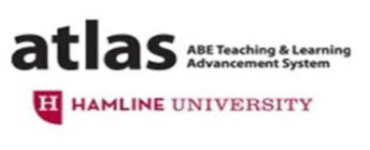For the past decade, ATLAS, housed at Hamline University, has been offering innovative professional development for adult basic educators across Minnesota. ESL education has been at the center of these efforts since the beginning! ATLAS cultivates new leaders as they work to improve the lives of adult immigrant and refugee learners in our communities.
Minnesota is enriched by immigrants and refugees from around the world, and English language acquisition is critical to navigate their new communities. Much focus is given to the language needs of children in K-12 settings, and neighboring this system to assist the adults in families is Adult Basic Education (ABE). ABE supports adults in gaining the skills they need for family-sustaining work, postsecondary opportunities, and full participation in their communities1. In ABE, we teach language, literacy, math, academic content, digital literacy, as well as employability and career-specific skills.
Minnesota ABE programs exist in every corner of Minnesota, hundreds of sites statewide. How do the teachers working within them gain the knowledge and skills they need for the classroom and keep abreast of new trends and requirements for their work? This is where ATLAS comes in! ATLAS, the ABE Teaching & Learning Advancement System, provides professional development to Minnesota’s adult education workforce. It is part of the MN ABE Support Network. Housed at Hamline University in St. Paul and solely funded by the Minnesota Department of Education, ATLAS has been fostering the growth of adult educators for over 10 years. In this article, we share a brief history of our work and the principles undergirding our efforts, and we showcase some of the projects specifically geared to adult ESL educators.
It All Started with ESL Experts
MN ABE has a long history of supporting adult ESL teachers. In fact, the original ATLAS grant was written in 2007 by Betsy Parrish, ESL Professor at Hamline University, and Kim Johnson, also an ESL specialist! Kim became the first ATLAS Director, and Betsy served as Senior ATLAS Advisor. Soon after, an administrator was hired to assist with finances, communications, and event logistics. As ATLAS initiatives and responsibilities grew, so did its staff. For example, ATLAS added a Literacy Coordinator when a national reading initiative (StAR) came to Minnesota ABE. In 2013, current Director Patsy Egan (another ESL person!) took the reins, and an Events Manager also joined the team. In the last five years, ATLAS has added positions for English Language Arts and Numeracy Coordinators, and several consultants assist with various projects yearly in areas such as adult career pathways, ESL, and standards implementation.
In Fall 2017, ATLAS celebrated 10 years of providing professional development (PD) opportunities for adult basic education teachers, including ESL teachers, throughout Minnesota. At the same time, the National Coalition for Literacy honored ATLAS with the National Literacy Leadership Award, citing its high quality, evidence-based professional development and ability to produce national leaders. “They intentionally cultivate teacher leadership,” said Silja Kallenbach of World Education at an awards ceremony in Washington DC, in October, 2017. In her remarks, Silja recognized the national impact of ATLAS’s Transition Integration Framework (TIF), which defines the academic, career, and employability skills essential for adult learners to successfully transition to postsecondary education, career training, the workplace, and deeper community involvement.
The figure (Figure 1) below represents visually how ATLAS serves adult ESL professionals statewide. At the center of this work are adult immigrant and refugee learners. Surrounding them is a delivery model for adult basic education that integrates English language and content, teaching language and skills related to employability, academic content, and careers. To support the work of adult ESL teachers, ATLAS provides professional development through various means: creating and sharing resources, delivering study circles, and hosting an annual Language & Literacy Institute. All of this work creates the conditions for leaders to emerge. Minnesota ABE practitioners are asked to facilitate workshops and study circles, to design and share resources, write articles for the statewide ABE newsletter, and to serve on our advisory teams. Our relationship with Hamline University’s ESL faculty continuously introduces ATLAS to relevant research, ESL graduate students, and many opportunities to collaborate.

Professional Development Models: Best Practices
Research has shown that ongoing professional development (PD) is far more beneficial than the one-shot workshop (Guskey, 2000). When professional learning is job-embedded, focused, and takes place over time with guided, meaningful collaboration among colleagues, teacher change and growth can truly take hold (Burt, Peyton, & Schaetzel, 2008; Desimone, 2009; Smith, 2010). These are principles that have always guided ATLAS’s professional development efforts. ATLAS does provide numerous conferences and one-time workshops and webinars that meet the needs of ABE practitioners around the state. Such one-shot PD experiences are important for quickly receiving pertinent information on topics such as state and federal accountability requirements and to promote interest in more involved PD. However, from the beginning of ATLAS, we have placed more of our energies and efforts on longer-term PD initiatives that foster greater impact on teaching and learning.
A few examples of job-embedded, extended PD efforts include cohorts on evidence-based reading instruction, standards implementation, adult career pathway development, career-focused contextualized teaching, and numeracy. Online Communities of Practice (using platforms such as Wiggio and now Schoology) provide networking and resource sharing among teachers of math, around standards implementation, and for those working in one-room schoolhouse contexts. Study circles are offered on employability skills (TIF), low-literacy adult ESL, integrating language and numeracy, and teaching pronunciation with adult English learners. All of these experiences – cohorts, communities of practice, and study circles – allow for the kind of professional learning that research shows leads to greater teacher development and higher student achievement (Darling-Hammond, Hyler and Gardner, 2017; Smith; 2016).
Central to all of ATLAS’s PD efforts is careful, consistent evaluation of participant outcomes. ATLAS PD providers have engaged in in-depth research and analysis of the results of two of their ESL study circles, highlighted in these publications:
Echelberger, A., McCurdy, M., & Parrish, B. (2018) Using a study circle model to improve teacher confidence and proficiency in delivering pronunciation instruction in the classroom. CATESOL Journal 30(1), 213-230.
Vinogradov, P. (2012). “You just get a deeper understanding of things by talking:” Study circles for teachers of ESL emergent readers. Journal of Research and Practice for Adult Literacy, Secondary, and Basic Education (1), 34-48.
Meeting Challenges with Innovation
A number of driving forces in the field of ABE nationally have sparked two remarkable shifts in recent years for adult ESL: an increased rigor of instruction and the promotion of instructional approaches that integrate language and content. Upping the rigor in adult ESL instruction has largely been driven by new legislation in the field. When the Workforce Innovation and Opportunity Act (WIOA) became federal law in 2014, it brought with it a strong emphasis on careers and employment, as well as new compliance requirements around standards-based education. These two facts have shifted adult ESL from its traditional role of ‘life-skills’ and ‘survival English’ teaching for new immigrants and refugees to preparing non-native speakers of English for high school equivalency, postsecondary options, and family-sustaining careers. While life-skills will continue to play an important role in adult ESL teaching, our work has expanded in recent years to connect with the larger array of services adult basic education offers.
Integrating language and content instruction is nothing new to K-12 EL teachers, but it is somewhat new to adult education settings. Historically, ESL has been silo-ed from other offerings in adult education such as math, GED preparation, and career pathways. But with WIOA and standards-based education, we are seeing a major shift toward including more substantive content in English language classes. The College and Career Readiness Standards (US Department of Education, 2013) have been adopted in Minnesota ABE, as well as the Transitions Integration Framework (TIF), which outlines employability skills, and the Northstar Digital Literacy Standards. These three sets of standards define what is taught in adult basic education in Minnesota2. Adult ESL teachers are no longer ‘just language’ teachers (if they ever were!); they are now responsible for helping their students meet all three sets of standards, as well as traditional language development.
Minnesota ABE has embraced these new priorities around increased rigor and integrating language and content, and ATLAS has responded in kind with new professional development opportunities. Of top priority has been the ‘de-silo-ing’ of ESL teachers, and bringing language teachers together with GED and career pathways teachers. A few examples include:
- Language & Literacy Institute (January), a large two-day conference for ALL adult basic education practitioners who touch reading, writing, and language instruction. Previously, this event was only for adult ESL teachers.
- Language & Literacy Advisory Team (LLATé), a group of teachers, administrators, and state leaders who meet quarterly to plan for reading, writing, and language professional development.
- Integrating Language & Numeracy Study Circle, a professional learning circle that helps language teachers integrate math content into their classrooms while assisting math teachers in better serving their non-native speakers.
- College & Career Readiness Standards Implementation Cohort, a year-long, job-embedded initiative that works toward standards alignment in programs and instruction. While many states train their ESL teachers separately, Minnesota has chosen to de-silo ESL and basic skills instructors, having them collaborate in teams on this complex work.
- Contextualized Career-focused Basic Skills Instruction (CCI), a six-month cohort that assists teachers in creating lessons and units for a specific career pathway that integrates academic skills (language, literacy, math) together with employability skills.
- Adult Career Pathways (ACP) Course Design, a six-month cohort that assists teachers and curriculum writers in developing or strengthening adult career pathways courses in their programs.
All of the above efforts work to de-silo adult ESL teachers and bring them into the fold of ABE, and in doing so, we raise the expectations and opportunities for adult immigrants and refugees to thrive in Minnesota. At ATLAS, we also recognize that sometimes ESL teachers need specific support around language development and immigrant resettlement. To this end, we continue to have offerings such as the following:
- Low-literacy Adult ESL Study Circles, professional learning circles that support teachers whose students are not literate in their first languages.
- Pronunciation Study Circle, an opportunity to focus on intelligibility and specific pronunciation issues with support from colleagues.
- Adult ESL Resource Library, a curated collection of excellent resources specifically chosen for adult ESL practitioners.
- MN ABE YouTube Channel, offering an ESL playlist and a pronunciation playlist with classroom videos and archived webinars specifically on
Looking Ahead
Looking back over the last 10 years of ATLAS, the field has changed immensely! Since it began, ATLAS has taken on more and more complex initiatives to keep ABE practitioners in Minnesota abreast of national trends, relevant research, and new requirements that affect their work. Many of the models developed by Minnesota’s ABE practitioners for ATLAS have had a national reach. ATLAS looks forward to cultivating continued collaborative leadership in the years ahead, addressing the needs of all adult learners in our state and beyond, and supporting the needs of practitioners in an ever-changing adult education landscape through innovative professional development practices.
References
Burt, M., Peyton, J.K., & Schaetzel, K. (2008). Working with adult English language learners with limited literacy: Research, practice, and professional development. Washington, DC: the Center for Applied Linguistics. Retrieved from http://www.cal.org/adultesl/resources/briefs/working-with-adult-english-language-learners-with-limited-literacy.php
Darling-Hammond, L., Hyler, M.E., & Gardner, M. (2017). Effective teacher professional development. Palo Alto, CA: Learning Policy Institute.
Desimone, L.M. (2009). Improving impact studies of teachers’ professional development: Toward better conceptualizations and measures. Educational Researcher, 38(3), 181-199.
Guskey, T.R. (2000). Evaluating professional development. Thousand Oaks, CA: Corwin.
Smith, C. (2016). The role of professional development in bridging research and practice in adult literacy and basic education. Journal of Research and Practice for Adult Literacy, Secondary, and Basic Education, 5(3), 40-43.
Smith, C. (2010). The great dilemma of improving teacher quality in adult learning and literacy. Adult Basic Education and Literacy, 4(2), 67. Retrieved from http://scholarworks.umass.edu/cie_faculty_pubs/36
Notes
- To learn more about ABE in Minnesota, see this 2017 Impact Report.
- To learn more about MN ABE standards, see this webpage: http://atlasabe.org/resources/content-standards








